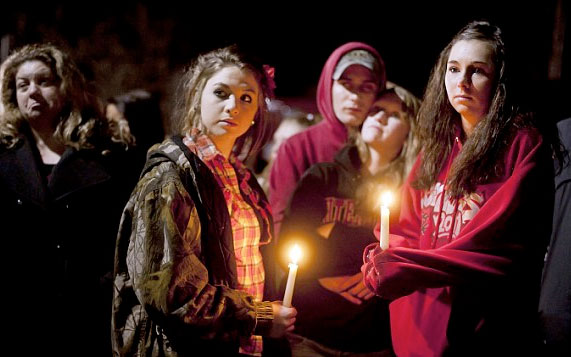By Julie Rine, Minerva Local Education Association
 It’s that time of year when teachers face two struggles: keeping our tempers, and writing final exams.
It’s that time of year when teachers face two struggles: keeping our tempers, and writing final exams.
Even the best teachers feel stress when the fast-approaching end of the year means getting those final exams ready while trying to finish the units left on the agenda. Meanwhile, kids are gone for field trips, early family vacations, and college visits, so keeping everyone caught up is half the battle. And all this means that what has driven us crazy all year threatens to drain even the kindest teacher’s supply of patience. For me, it’s things like hearing “Do you have a pencil I can borrow?” (because why would one bring a pencil to English class, right?), and of course, the inevitable “Will this be on the exam?”.
Creating final exams is a tricky business. It causes both veteran teachers who have taught thousands of students and the novices to the profession who are finishing their first year to sit down (or collapse, as the case may be) and wonder what their students have learned this year. What did they truly and deeply learn? I’ll admit, some days, I might even ask did they learn anything? This is my own final exam. How did I do in teaching those ever-distracted teenagers, many of whom find nothing relevant to their lives in my class, despite my use of music and YouTube and Chrome Books and Prezis and Power Points and prayers (I didn’t teach them the prayers; those were strictly mine).
The craziness of the end of the year and writing exams leads to a much shorter temper for me. Each April I promise myself I will keep my patience no matter what, and every year I fail. Occasionally my frustration erupts. “Are you kidding me? You didn’t bring paper or a pencil to English class? Seriously?” And every year, as I work on writing my final exams, I wonder if my kids have learned enough American Literature and if I have done enough to prepare them for college writing and passing the ACT.
But this year is a bit different. On a November morning last fall, a car accident took the lives of three of my students. No one was drinking, no one was texting while driving, no one was driving too fast; the roads just turned from wet to ice in no time and their car collided with a school bus. A’liyia, who was a junior in my class two years ago, was a freshman at WVU, loving her first year of college and being the student manager of the women’s basketball team. Storm was a senior athlete who had just finished football season and was getting ready for basketball season. Savannah was a beautiful girl in my 3rd period class this year. Like many kids, she was quieter in class than she was with her friends. I was just beginning to get to know her.
I will never forget getting the news, attending the vigil, or the near silence as kids changed classes the Monday after the accident. So many images are seared into my memory: the looks on their faces, pleading with me to make sense of this for them and my inability to do so; the many hugs and tears our staff and student body shared in those first days; the entire town, it seemed, forming a line around the halls of our school for the calling hours; the gym, normally filled with spectators cheering at a sporting event instead filled with mourners of all ages.

When I reflect back on what my students learned this year, I know they learned more than just English. They learned how to survive a loss so devastating, moving forward seems impossible. They learned that their teachers are vulnerable, and that in some situations, we do not have the answers. They learned that the friends they have known since kindergarten might not walk across the stage at graduation with them. Those are the lessons you can’t put on a final exam.
And when I think about my year, I know that this year more than any other, it was about so much more than the common core and the ACT test. I always knew I loved my students, and I had often said I didn’t know what I would do if I lost any of them. Now I know. I cried for days and found myself remembering all the little moments I had had with each of them that seem so much more meaningful now. I hugged more kids this year than in all my previous years combined, and I cried right along with them when the hand of grief, without warning, reached out and choked us. And, on these final days of the year when the stress gets high and my temper gets short, I have learned to be grateful that an absent student is merely gone for a day or two. I have learned to think before speaking; what I would want my last words to any of my students to be? They would not be something sarcastic about bringing a pencil to class.
I learned that the PARCC and final exams will not be the biggest tests anyone in my school faces this year.
The test we face will not end when the school year ends; it will continue on as our town strives to support each other and the families of A’liyia, Storm, and Savannah, while never forgetting the lessons losing them taught us.


